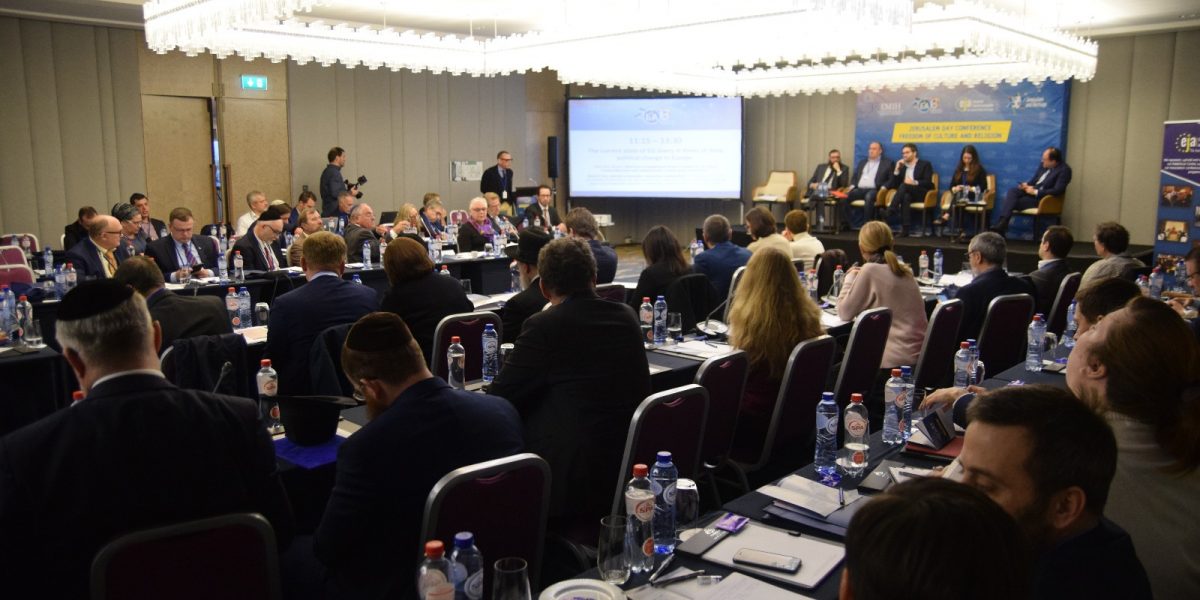European Jewry Defines the Red Lines

The growing anti-Semitism and the political radicalization throughout Europe were the focus of the annual conference of the EJA, which took place on Tuesday and Wednesday, October 30-31, in Brussels, in the European Parliament Building, among other venues. Hundreds of participants, including heads of Jewish communities and heads of Jewish organizations, arrived from all over the Continent with the goal of establishing the “red lines” for European Jewry, ahead of the upcoming elections for European Union institutions and for various European states.
The EJA issued a draft listing the “red lines” for hundreds of Jewish communities and organizations, representing all sectors and all European countries. Based on this, and with the input and comments of the delegates, a document was finalized during the conference outlining the principles that will be presented to the various political entities of each country vying for representation in their national parliaments and in the European Union Parliament.
Rabbi Menachem Margolin, chairman of the EJA and director of the RCE, remarked: “Europe stands today at a political crossroads, and it is likely that the political map throughout the Continent will polarise even more after the 2019 elections. This conference is a unique opportunity for Jews from all of Europe and from the entire religious spectrum to sit together, to discuss their concerns openly, and to draw clear red lines for all the parties vying for the institutions of the European Union and of the individual European states in the upcoming elections.”
Ron Yishai, director general of the Jerusalem Affairs and Heritage Ministry, spoke before the Parliament of the European Union, saying, “There has never been any legitimate legal question regarding the national identity of Jerusalem. There has never been a time when control of Jerusalem was unclear. After World War I, the right to sovereignty over the city passed from the Turks to the League of Nations, and from there it was awarded directly to the State of Israel at the end of the British Mandate. This is grounded in international law.
“Israel is being attacked based on Partition Resolution 181, which itself ran counter to international law, in that it called for changing the country’s boundaries from those that were stipulated by the Mandate. Since the Arabs themselves rejected the resolution, it has no legal standing. Such resolutions are binding only when all the relevant parties agree to them, and in this case that never took place. Therefore, after Israel’s War for Independence, Israel was the sole legal contender for sovereignty over Jerusalem. The Jordanians were occupying territory illegally at that time according to international law.
“The Six Day War served to correct this injustice, returning territories to Israel that it was legally entitled to all along. Resolution 242 did nothing to change this situation; it left Israel with the full legal right to control Jerusalem, recognizing that she had acted in self-defense against an illegal aggressor, in accordance with the UN charter. Those who drafted resolution 242, among them the ambassadors of Great Britain and the United States to the UN, stated explicitly that the resolution does not demand that Israel withdraw to the territories it held before the war.
“In every discussion regarding sovereignty and legal possession of the territories, the Palestinians have never had any legal status, because resolution 181 never gained any validity or legal authority. The dispute was solely between Israel and Britain, and later between Israel and Jordan. It is absolutely clear that according to international law, full sovereignty over Jerusalem belongs to Israel alone. There is simply no other way to interpret the law.”
Participating in the EJA’s annual conference were: Mircea Pascu, one of the vice presidents of the European Union and a member of its parliament; Jan Jambon, the Belgian Minister of the Interior and Security; Katharina von Shnurbein, the European Union’s Coordinator on Combating Anti-Semitism; Ron Yishai, the director general of the Jerusalem Affairs and Heritage Ministry; the heads of B’nai B’rith Europe, of the Simon Weisenthal Center, of the European Union’s March of Life project, and of the French Consistory; members of parliament; and senior politicians, ambassadors, and news reporters from all over Europe.
The conference opened with a report on manifestations of anti-Semitism from Scandinavia in the east to Britain in the West. Among the issues brought up was how, if it is even possible, to establish a dialogue with extremist political parties, which are gaining popularity in Europe, especially in the wake of the mass Muslim immigration to the Continent.
The RCE, which worked together with the EJA to initiate the conference and to bring together the Jewish community leaders, considers this conference to be vitally important, as the primary issues facing the community rabbis and lay leaders were addressed.


